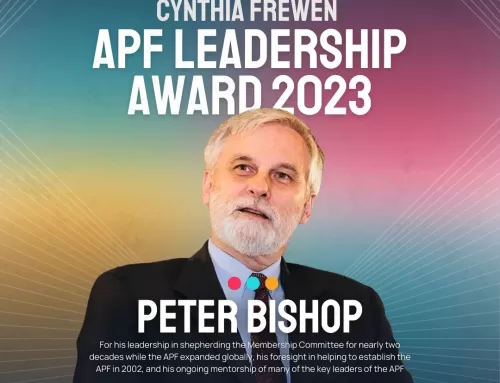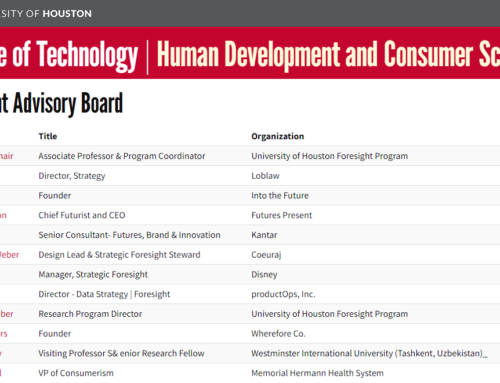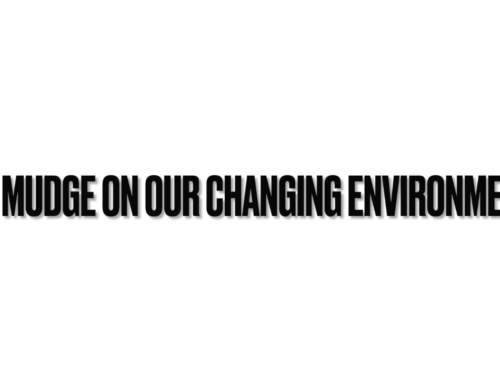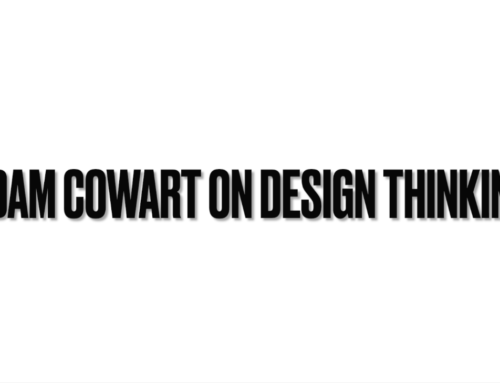We were very pleased to have Jay Gary, PhD, Assistant Professor at Regent University’s Strategic Foresight program was a guest to our ProSeminar class. He discussed his research on the professionalization of foresight, based on Delphi Survey he conducted with a colleague from Germany, Dr Heiko von der Gracht of EBS (European Business School). Here are Jay’s slides. I’d like to mix in a few thoughts of my own as I’ve been working on a piece regarding the professionalization of foresight (might we have a “hot topic” here?) and it might be helpful to expose a few of those ideas.
The Delphi had 142 respondents with all continents represented globally. The question was raised as to how representative that number was in terms of what percentage of professional futurists that might represent, which stimulated a guessing game that concluded: “we still don’t know.” one of my recommendations is to do a Census of the foresight field. It will be interesting to see what I come up with in terms of “how.”
Jay noted right up front that professionalization is not the only thing that needs to be done. We need to build the field as a whole, which includes, for instance, building the academic base, and building our public profile. Given that, he defined the focus of the Delphi as being on “strategic foresight,” which is focused on “influencing decision-makers” in a competitive situation – noting roles of consulting and organizational futurists with champions and clients. He then used Porter’s 5 forces to situation the competitive landscape. This distinction of strategic foresight fits with my notion that the field ought to be called “foresight” and then we can add clarifying adjectives as needed, e.g., strategic foresight, social foresight, technology foresight, etc.
One very nice slide summarized the 7 marks of a profession. I say “nice” because I’ve taken an academic approach on this question that is perhaps less easy to read – this summary covers the territory and gets to the point:
- Knowledge base
- Competency profile
- Accredited training
- Professional body
- Global council
- Professional skills
- Code of ethics
Jay noted that the “Global Council” would probably be the hardest because it requires consensus (and heads nodded) and that the others could be done first.
We then did a quick-and-dirty version of the Delphi, which consisted of 14 statements about outcomes regarding professionalization in 2030.
It’s worth noting that the real-time Delphi tool that the study used is really cool. As you take the survey, you immediately see how your responses compared to others, and can view their comments (all anonymously) so you don’t have to wait for second round as with traditional Delphis. Very sweet software!
We then discussed the results, noting similarities and differences. I don’t want to give away the answers, since Jay will be publishing that (or you can view his slides at the link above if you’re curious).
I will call out that Jay sees a big emerging need to build our “competency maps.” I suspect that is a topic we are going to hear more about in the next few years.
This is hugely important work and we all owe Jay a big thank you. One of the weaknesses of our field is that we lack basic data about what is going on (e.g., how many of us are there?) and this study gives us some solid data to inform our conversations about professionalization. It takes away some of the guesswork and gives us a solid grounding, e.g., claims such as “no one cares about certification” or “everyone wants certification,” can be compared to the findings of the Delphi Survey (which suggests a split). Andy Hines





